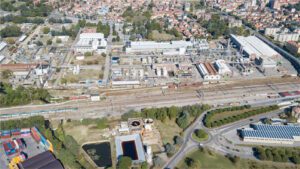Trinseo (Berwyn, Pa.) announced the inauguration of its next generation, polymethyl methacrylate (PMMA) depolymerization plant in Rho, Italy. Scheduled to be commissioned in Q1 2024, this demonstration facility marks a pivotal step towards reshaping the plastics ecosystem as part of the circular economy. PMMA, renowned for its versatility in various applications, will be transformed through this advanced recycling and purification process where it can go back into the plastics value chain and support the goal of circularity. This depolymerization operation will be designed to enable the efficient recycling of end-of-life PMMA, as well as other difficult to recycle structures, which will ultimately be used to produce acrylic resins, sheets, and compounds containing recycled materials.

Trinseo Manufacturing Operations, Rho, Italy (Source: Trinseo)
Depolymerization is a chemical recycling technology which is complementary to more traditional mechanical recycling processes. While mechanical recycling is vital to a successful circular economy, depolymerization creates brand new opportunities by reducing the polymer back to its constituent monomers. This allows for the recycling of a wider variety of PMMA-based materials, supporting an increase in recycled content and overall recycling rates, and helping reduce the manufacturing demand for virgin materials.
“Innovation in recycling technologies is imperative to effectively recycle various types of materials. This new facility is yet another major achievement towards a scalable system with the goal of making PMMA a truly circular material of high quality,” said Trinseo’s Chief Sustainability Officer, Francesca Reverberi. “When combined with our own in-house sourcing and treatment of collected materials through our Heathland recycling operation, our PMMA depolymerization plant will offer a high-performance solution for a world increasingly looking for new ways to address sustainability in the plastics supply chain,” added Reverberi.
Trinseo’s depolymerization facility is being developed around a continuous recovery model to produce high quality recycled PMMA that matches the quality of its virgin counterpart, promoting a circular plastics value chain without compromising performance. Using this advanced recycling technology, the introduction of recycled monomer into the supply chain helps support achieving targets for lowering carbon emissions, water consumption, and the conservation of natural resources, as indicated by the MMAtwo project’s environmental benefits calculator. A shift towards PMMA depolymerization can help deliver sustainability benefits for consumers, manufacturers, and industries alike. From car lamps to signage and more, this technology creates the opportunity to give a range of everyday products a second life and beyond.
Material produced using the depolymerization process will be integrated as part of Trinseo’s distinctive “R-Life” portfolio designed around a commitment to sustainability, covering both mechanically and chemically recycled PMMA grades. These products find applications across mobility, construction, and consumer goods, aligning with the growing demand for products that are developed with sustainability in mind.